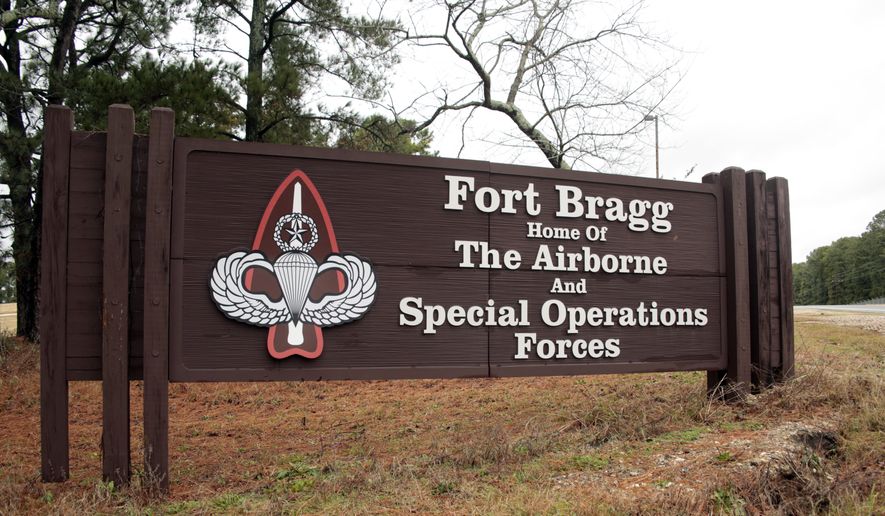The countdown has now begun for 10 Army posts named for Confederate leaders after the Senate on Friday overrode President Trump’s veto of the National Defense Authorization Act (NDAA) for fiscal year 2021 New Year’s Day.
The Pentagon’s $741 billion defense policy bill included a provision that set aside $2 million for a blue-ribbon panel to remove any monuments or symbols on military installations that honor leaders of the Confederacy. Pushed by Sen. Elizabeth Warren, Massachusetts Democrat, the provision was repeatedly singled out by Mr. Trump as one reason he was rejected the bill.
But now the panel and Pentagon faces a major logistical and branding chore, including finding acceptable new names for the outposts, which include some of the biggest and best-known bases the Army oversees.
The 10 posts are Fort A.P. Hill, Fort Lee and Fort Pickett in Virginia; Fort Hood in Texas; Fort Rucker in Alabama; Fort Bragg in North Carolina; Camp Beauregard and Fort Polk in Louisiana and Fort Benning and Fort Gordon in Georgia. The forts, all in former states of the Confederacy, were mostly named in the years after World War I and during World War II.
Mr. Trump argued that changing the names was an effort to erase American history, but Rep. Anthony Brown, Maryland Democrat and vice chair of the House Armed Services Committee, said the modern multiracial character of the Army made the names both obsolete and offensive.
“We cannot ask young service members to live, train and raise their families on bases honoring men who betrayed their country to keep Black men, women and children in bondage,” said Mr. Brown, who is Black and served as a colonel in the U.S. Army Reserves. “The United States does not lack for heroes we should honor and whose examples can serve as inspirations.”
Joint Chiefs of Staff Chairman Gen. Mark Milley, who supported the idea of the commission before Mr. Trump came out in opposition, noted at a congressional hearing last year that a fifth of the soldiers in the Army are black.
Under the bill, within 45 days the secretary of defense will appoint four members to the committee while the chairman and ranking members of the Senate and House armed services panels will each appoint one member. The panel faces a three-year deadline to submit their recommendations to Congress.
The bill provides $2 million for the commission to do it work. The cost to the Army in signage, stationery and other aspects of the renaming is not known. The Houston Chronicle recently reported that changing the names of eight Houston middle and high schools that commemorated Confederate figures cost the school system $1.2 million.
While most of the attention was generated by the controversy over the Confederate base names, the NDAA has a much wider sweep: any base, installation, street, building, facility, aircraft, ship, plane weapon or piece of equipment with a Confederate name. Grave markers with references to the Confederacy will be exempted.
But “Congress expects the commission to further define what constitutes a grave marker,” according to the new law.
The United Daughters of the Confederacy on their website denounced hate groups or anyone who promotes “racial divisiveness or white supremacy,” but said memorial statues and markers honored Confederate leaders have been a part of the Southern landscape for decades.
“We are saddened that some people find anything connected with the Confederacy to be offensive. Our Confederate ancestors were and are Americans. We as an organization do not sit in judgment of them nor do we impose the standards of the 19th century on Americans of the 21st century,” Linda Edwards, president of the United Daughters of the Confederacy, said in a statement.
Ms. Warren noted this summer that the bases were not named in the immediate aftermath of the Civil War, but decades later when Jim Crow laws and segregation statutes were being bulked up.
“They were named … to strengthen a movement that tried to glorify the Confederacy and reinforce white supremacy,” Ms. Warren argued in June.
In a letter to leaders of the Senate and House armed services committees, Ms. Warren and 35 other Senate Democrats said renaming the bases does not disrespect the military. Instead, it “honors the sacrifices and contributions of our service members in a way that better reflects our nation’s diversity and values.”
“Millions of service members of color have lived on, trained at and deployed from installations named in honor of traitors that killed Americans in defense of chattel slavery,” they wrote. “It is long past the time to correct this longstanding, historic injustice.”
• Mike Glenn can be reached at mglenn@washingtontimes.com.




Please read our comment policy before commenting.